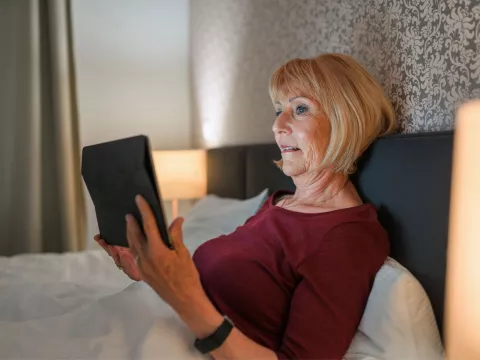- AdventHealth

Reaching out, checking in and keeping in touch makes a difference in the lives of the people we love, regardless of their abilities or needs. During the coronavirus pandemic, we can all use a little help from our friends to feel connected with the outside world while sheltering in place at home.
Face-to-Face While Staying in Place
To get together without leaving the house, people are doing video chats through platforms like Zoom, Skype and FaceTime. Video calls for virtual meetings, social hours and even family game nights have become a popular way to stay socially connected to friends, teachers, professors, family and co-workers.
Video calls may help you get your work done and ease the loneliness of staying home to help slow the spread of coronavirus. They’re also an easy way to say happy birthday or congratulations to a friend or loved one during this quarantine.
And for health care, video visits with your doctor online are a safe and easy alternative while staying hunkered down at home. Through the AdventHealth app, you can visit with a health care provider for most minor health problems.
Considering Alternatives to Video Chats for Friends With Special Needs
For adults with special needs, video chatting may not be the best way to stay in touch during this quarantine. Not everyone may have a smartphone or computer with a webcam.
Or, perhaps your friend or co-worker isn’t familiar with the technology or can’t log on. In any event, don’t let these factors deter you from reaching out to them to check in and see how they’re doing.
Everyone needs an outlet to talk and connect and a way to understand what’s happening with coronavirus while expressing their needs and concerns. COVID-19 may be especially stressful for people who face communication challenges, like people who have:
- Acquired conditions, such as traumatic brain injury, spinal cord injury and stroke
- Degenerative conditions, such as dementia and ALS
- Developmental disabilities, including intellectual developmental disabilities, autism spectrum disorder, cerebral palsy and Down syndrome
6 Low-Tech Ways to Stay Connected
To stay connected with the adults in your life with special needs during COVID-19, think beyond video chatting. There are plenty of other ways to say you care and offer your support, even from home.
1. Send a Letter
Sending a handwritten letter or card lets your co-workers or friends with special needs know that you’re thinking about them. Writing a letter may feel old-fashioned, but receiving snail mail never gets old.
2. Pick Up the Phone
The Centers for Disease Control and Prevention (CDC) recommends that people with disabilities plan at least two ways of communicating from home and work that can be used rapidly in an emergency. Find out which form of communication your friends or co-workers with special needs prefer or find easiest to use. Is it a landline or cell phone? Text messaging or email?
Then, check in on them regularly using their preferred communication method. If a phone call is best, maybe text them first to let them know when you’ll be calling to give them a heads-up.
3. Say Hi Through Social Media
Are your loved ones with special needs on Facebook, Instagram or Twitter? Reach out by sending an instant message or a tweet. Or post on Facebook and tag them so that they’ll be sure to see it.
4. Send a Care Package
What do your friends or co-workers with special needs like, want or need? Think about ordering essential items for them, such as toilet paper and non-perishable food like canned goods or a gift of their favorite food.
The CDC recommends that people with special needs have enough items and groceries to be comfortable staying home for a few weeks. They should also have at least a 30-day supply of over-the-counter and prescription medicines and any medical equipment or supplies they might need. So, be sure to ask if they need anything.
5. Share a Silly Photo
Whether it’s the latest cat in a costume or cute baby video circulating on social media, bring a smile to your friend’s face by sharing funny photos and videos. A good laugh can go a long way to boost anyone’s physical and mental health.
6. Text or Email a Memory
Connect with your friend by reminiscing about a shared memory, such as, “Remember our department’s outing to the ballgame?” or “When I think of working together, I always think of that fun time we had at the company picnic.”
Spread the Word About Staying Safe
While you’re checking in to see how your co-workers and loved ones with special needs are coping during COVID-19, you might also want to ask about how they’re holding up and staying safe.
Encourage Safety Steps
You can encourage them to take steps to prevent getting sick, including:
- Asking their direct support providers whether they’re experiencing symptoms of coronavirus, or if they have been in contact with someone who has
- Avoiding touching their nose, mouth or eyes
- Cleaning and disinfecting equipment, such as wheelchairs, walkers, scooters, canes, oxygen tanks, tubing, communication boards and other assistive devices
- Practicing social distancing by staying at least 6 feet away from others
- Requesting that their direct service providers wash their hands when they enter their home and before and after dressing, bathing, showering, transferring, toileting and feeding them
- Washing their hands for at least 20 seconds with soap and water often
If Need Be, Help Them Make a Plan for if They Get Sick
If your friend or co-worker doesn’t have one yet, help them formulate a plan if they or their direct support providers get sick. According to the CDC, adults with disabilities are three times more likely than adults without disabilities to have heart disease, stroke, diabetes or cancer. These and other underlying medical conditions, such as chronic lung disease or a weakened immune system, may put people with disabilities at higher risk of becoming infected with coronavirus or having serious illness from COVID-19.
The CDC recommends that people with disabilities create a list of family, friends, neighbors and local service agencies that can provide support in case they or their direct support providers become ill or unavailable. You can offer to be on this list, if it’s feasible and realistic for you.
Focus on Encouragement
In general, when talking about coronavirus, it’s important to remain calm even though you may be dealing with your own anxieties and to have honest conversations in response to any questions that adults with special needs may have. Encourage friends and co-workers with special needs to talk with their physician if they have a question about their health or how their health condition is being managed.
We’re Here for You During the Coronavirus Pandemic
We’re dedicated to helping you stay connected, healthy and safe during this pandemic. Visit our Coronavirus Resource Hub, which we are constantly updating with news and information for you and your family and loved ones.


